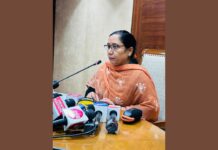Transformational Budget 2022-23: A key for providing Rural people of J&K better prospects of economic development
JAMMU, APRIL 03 2022
The Union Territory of Jammu and Kashmir is poised to become the latest success story among other States/ Union Territories and model of socio-economic development for the Country.
To achieve this objective, the government has granted a significant allocation in the Budget 2022-23 for the Rural sector for the development of these areas and uplifting their status.
READ MORE :-Government welfare schemes bringing sea change in lives of people: CM
RURAL ECONOMY
Out of total population of Jammu and Kashmir, more than 70% live in rural areas. Development of rural areas is key to overall development of J&K. The Rural sector needs infrastructure to support and ensure significant investments and developmental aids.
For Rural Sector, an allocation of about Rs.4,627.85 crore has been made under Capital Expenditure for the year 2022-23 which is Rs.327.40 crore more than the previous year’s budget allocation. In the recently announced budget for J&K, under MGNREGA, 426 lakh person days are targeted to be generated during 2022-23. Also, 60,000 job cards are proposed to be issued based on demand and 1 lakh developmental works of different nature will be initiated and expected to be completed.
Under Rashtriya Gram Swaraj Abhiyan (RGSA), 1,500 elected representatives will be provided exposure visit outside Union Territory of J&K. Capacity building and refresher training will be imparted to 1,12,000 participants (PRIs/Line Department Officers/Officials) in phased manner.
More so, internet connectivity will be provided to all the gram panchayats across Union Territory of J&K. 400 new and 300 existing panchayat ghars will be taken up for construction and renovation respectively.
Under the new budget, 54,000 houses will be constructed under Pradhan Mantri Awas Yojana Gramin (PMAY – G) during 2022-23. Under Swachh Bharat Mission-Gramin (SBM-G), 87,250 Individual Household Latrines (IHHL) and 2,500 Community Sanitary Complexes (CSC) are targeted to be constructed during 2022-23.
Under National Rural Livelihood Mission (NRLM), 21,194 Self Help Groups (SHGs) are proposed to be formed during 2022-23, 20,000 revolving fund and 18,000 Bank linkage are targeted to be covered.
Under Himayat (Deen Dyal Upadhyaya-Gramin Kaushalya Yojana), the skill training to 14,067 youth and 9,847 job placements are proposed to be taken during 2022-23.
Construction of residential/office accommodation for members of District Development Council/Block Development Council/Panchayati Raj Institutions (DDC/BDC/PRIs) has been initiated. A provision of Rs.176.32 crore has been kept for the same in the budget 2022-23.
ROAD CONNECTIVITY
For Road and Bridge Sector, an allocation of about Rs.5,217.87 crore has been made under Capital Expenditure for the year 2022-23. Upgradation of 1750 Kilometer Road length is likely to be taken up after receiving sanction of PMGSY-III during 2022-23. 50 bridges will be completed under Central/ Union Territory Sector schemes during 2022-23.
Government of Jammu & Kashmir has rolled out 3rd party inspection mechanism in Public works (Roads & Bridges) Department. All ongoing works will be brought under the purview of 3rd party inspection mechanism from financial year 2022-23. Maintenance of existing Road Infrastructure will get focused attention during 2022-23 in terms of Road Maintenance Policy 2021 approved by the Government of Jammu & Kashmir.
Overall 6,000 Kilometers of black-topping of roads is expected to be achieved during 2022-23 under Pradhan Mantri Gram Sadak Yojana (PMGSY)/ Cities & Towns/Central Road and Infrastructure Fund (CRIF)/National Bank for Agriculture & Rural Development (NABARD)/ Pothole Free Roads.
A good infrastructure and wide connectivity are the key factors for growth and development of the UT. Increased participation of people in the rural development process, decentralization of planning and greater access to credit and inputs holds the key in providing the rural people with better prospects for economic development.

 हिंदी
हिंदी






